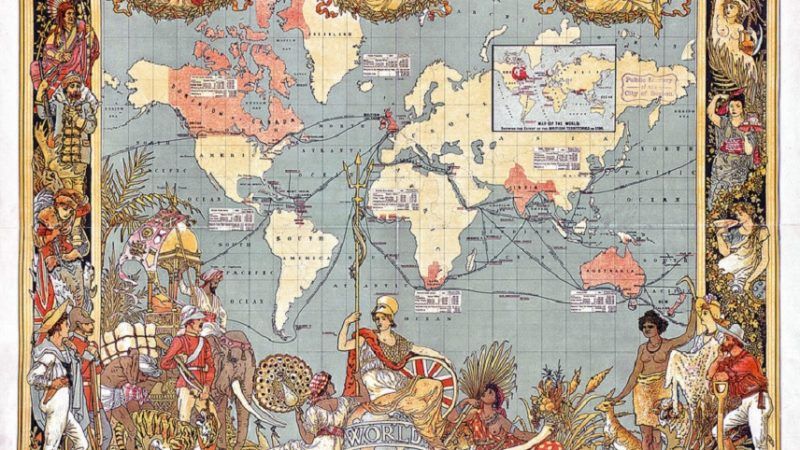Classical Liberalism Is Incompatible With Imperialism
Imperialism is not the highest stage of capitalism, as Karl Marx claimed.

August marks 70 years since the partition of the Indian sub-continent and the beginning of the slaughter that followed the creation of Hindu-majority India and Muslim-majority Pakistan. The anniversary occasioned much intellectual self-flagellation in the United Kingdom, even though, as Christopher Booker explains, the former colonial power did try to keep its old colony together.
In general, libertarians are not in favor of imposing Western values on people elsewhere, even though we happen to believe that political and economic freedoms are desirable and beneficial. That has long been the case. Adam Smith was an avid anti-imperialist who thought that empires were "a waste of money," while Richard Cobden thought that free trade and non-interventionism in foreign policy should go hand in hand.
"So far as our commerce is concerned," Niall Ferguson quotes from Cobden in his 2004 book Empire: How Britain Made the Modern World, "it can neither be sustained nor greatly injured abroad by force or violence. The foreign customers who visit our markets are not brought hither through fear of the power and the influence of British diplomatists; they are not captured by our fleets and armies; and as little are they attracted by feelings of love for us… It is solely from the promptings of self interest that the merchants of Europe, as of the rest of the world, send their ships to our ports to be freighted with the products of our labour."
Why rehash this seemingly ancient history? Because classical liberals and libertarians are not the only critics of imperialism. Communists and their fellow travelers, while ignoring the vast imperial domain that the Soviets built for themselves in Eastern Europe and Central Asia, have picked up the baton of anti-imperialism and used it, very effectively, to bludgeon the advocates of free markets as neo-imperialists. In fact, one of the biggest and most pernicious myths in the literature of economic development is that capitalism exploits the many, such as the colonies, while benefiting only the few, such as the colonial powers.
The origins of this myth go back to Karl Marx, who thought that, under capitalism, competition would drive down profits, thus necessitating greater exploitation of the workers. The mistaken theorizing of the German economist (real average global income per person rose by factor of 10 over the last 200 hundred years) was then updated by Vladimir Lenin in his immensely influential 1916 pamphlet, Imperialism, the Highest Stage of Capitalism.
The update was necessary because by Lenin's time, the workers in the western industrialized countries were unambiguously better off than when Marx wrote Das Capital (1867). And so, the first dictator of the Soviet Union invented a new thesis. Contra Marx, the living standards of the western workers continued to improve, Lenin argued, because of the riches that flowed to the West from the exploited colonies. Lenin's thesis had a profound effect on generations of Third World leaders, who rejected capitalism and embraced some form of socialism instead. To this day, most of the developing world remains less economically free than most of the West.
Colonialism and the developing world's reaction to it have led to much misery, but the West has not escaped its imperialist past unscathed. In his new book, The Strange Death of Europe: Immigration, Identity and Islam, the British writer Douglas Murray explains how colonial guilt undermines Western confidence and makes Westerners uneasy about the morality (i.e., justice) of the global distribution of wealth.
But, as Deirdre McCloskey shows in Bourgeois Dignity: Why Economics Can't Explain the Modern World, "colonial wealth accumulation" cannot, mathematically speaking, account for the 16-fold increase in the Western standards of living since the early 1800s. Similarly, the Nobel Prize-winning economist Angus Deaton and University of Maryland philosophy Professor Dan Moller, have shown that Western prosperity preceded Western imperial expansion (i.e., Western imperialism was an outcome of rising property in the West, rather than the reason for Western prosperity).
For those who doubt these modern takes on the origins of Western prosperity, consider the words of the British writer Samuel Johnson, "By what means are the Europeans thus powerful; or why, since they can so easily visit Asia and Africa for trade or conquest, cannot the Asiatics and Africans invade their coasts, plant colonies in their ports, and give laws to their natural princes? The same wind that carries them back would bring us thither."
Johnson wrote those words in 1759, 22 years before James Watt discovered the steam engine. As late as 1789, European settlements in sub-Saharan Africa still consisted of only a small Dutch colony in the Cape of Good Hope and a few Portuguese stations along the African coasts that would (much) later become Angola and Mozambique.
All in all, imperialism is a bad idea and we should have none of it. That said, imperialism does not and cannot explain either the roots or the extent of Western prosperity.


Show Comments (49)